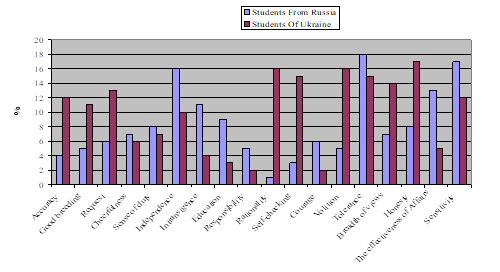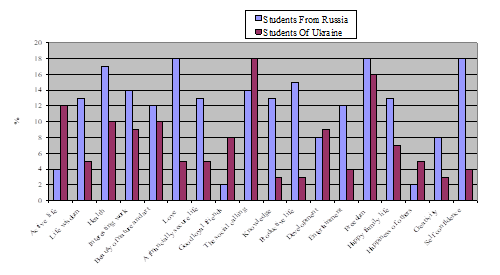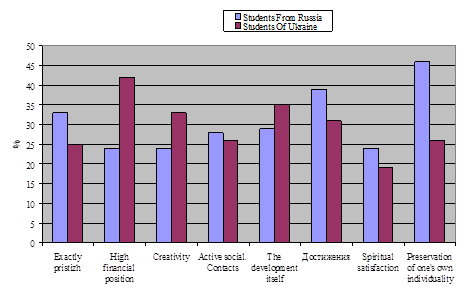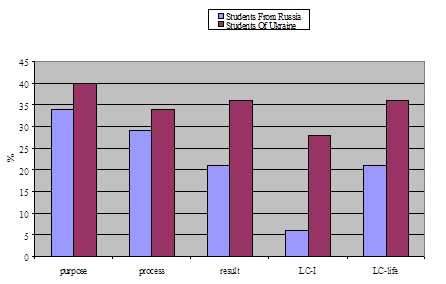Abstract
The relevance of the article is determined by the processes of modernization of pedagogical education in these countries, which cannot be considered outside the socio-economic, socio-political and spiritual and moral transformations in these societies caused by the radical restructuring of the domestic and foreign policy of these States. The purpose of the article is to identify, define and justify the features of the structure of the value-semantic sphere of students of pedagogical universities in Russia and Ukraine. The leading method of research of the specified problem is a method of testing; the method of multidimensional mathematical statistics was used for processing of the received data as the factorial analysis allows to reveal the most hidden communications. The hierarchy and eight-factor structure of values and personal meanings of students of pedagogical universities of Russia and Ukraine at the stage of modernization of pedagogical education are revealed by empirical means. These are the main regulators of students’ activity in pedagogy. The materials of the research can be used in the practice of modernization of pedagogical education in Russia and Ukraine for the development of educational programmes of pedagogical universities and work plans of group supervisors and mentors.
Keywords: Modernization of pedagogical educationstudents of pedagogical universitiesvalue-semantic spherevaluespersonal meanings
Introduction
At this stage, Russia and Ukraine are influenced by the radical socio-economic reforms, and during this period the cultural framework which defined the processes taking place in society, crystallized the basic identification communities and integration trends, weakens its deterrent effect. The weakening of these cultural frameworks has led to a shift in emphasis in the traditional value system. In this situation, there is a reassessment of values and personal meanings. Values and personal meanings are the most important characteristics of the inner world and also components of personality. In this regard, it is legitimate to consider them as an intrapsychic entity which unites a person and the outside world in one system which, in turn, determines the content of their value-semantic sphere. The value-semantic sphere is studied by various Sciences. The advantage of this study of one problem is complementarity (Ikonnikova, 2001). The value-semantic sphere is a specially organized system of value-semantic formations represented in the form of meanings and values between which mutual transitions are possible (Sharov, 2000).
Problem Statement
Due to the special susceptibility and high social mobility of students of pedagogical universities, the emergence of new value orientations and devaluation of the former, changes in the structure of personal meanings affected this group to a greater extent than other segments of society. It is this social group that represents the immediate future of Russia and Ukraine (Lisowski, 2004). Students of pedagogical universities have their own specific mental and physiological characteristics, style of behavior, cultural norms and values due to a certain way of life, in their social status they are close to the intelligentsia being its reserve and act not only as carriers, but also as broadcasters of values and personal meanings formed in the process of obtaining pedagogical education (Mazurchuk & Mazurchuk, 2012).
Research Questions
What are the peculiarities of the value-semantic sphere of pedagogical students in Russia and Ukraine?
Purpose of the Study
The purpose of the article is to identify, define and justify the features of the structure of the value-semantic sphere of students of pedagogical universities in Russia and Ukraine.
Research Methods
The study is based on the main provisions of cross-cultural and axiological approaches (Rozov, 2008).
Cross-cultural approach is one of the newest approaches used in modern psychological and pedagogical researches. It allowed us to consider the cultural peculiarities of the content of the value-semantic sphere of students of pedagogical universities in Russia and Ukraine (Vishnevsky, 1997)
Reliance on the axiological approach allows to consider students, regardless of their physical characteristics, as carriers of values and the highest value, and also the value as the basis of the way of life of the societies under consideration (Omelchenko, 2004).
In the context of these approaches, in selecting research methods we should pay attention to the specifics of respondents who are carriers and broadcasters of values and personal meanings in the culture of their countries.
In this regard, we have chosen theoretical and empirical methods as well as methods of mathematical and statistical data processing. The theoretical methods are the following: analysis of scientific literature, synthesis, generalization, systematization, method of linguistic semantics, which allows to study the lexical meaning of the basic concepts and changes in their values in the development of science itself. As a basic empirical research method, we denote testing. We used valid and reliable instruments for the collection of empirical data: methods of study of value orientations of M. Rokich modified by D. A. Leontyev, the Questionnaire of terminal values by I. G. Senin, the test of life-meaningful orientations by D. A. Leontyev (1992, 1999). Methods of mathematical and statistical analysis used to process the obtained data are: Kolmogorov-Smirnov criterion to determine the difference between the distribution of variables from the normal one; factor analysis to identify the factor structure of the value-semantic sphere of students of pedagogical universities in Russia and Ukraine and compress the initial information by reducing the number of variables.
The study of the peculiarities of the value-semantic sphere of students was conducted on the basis of pedagogical universities of Russia and Ukraine. The study was attended by third – year students in the amount of 102 people (Russia – 51 people; Ukraine-51 people). This sample, on the one hand, already carries the results of the influence of various factors, and on the other hand, the value-semantic sphere of its representatives remains quite flexible, subject to various influences. The life experience of this group is not rich, ideas about moral and ethical values are often not finally determined; the problems associated with the peculiarities of age are aggravated by psychophysiological imbalance, the presence of ‘adult’ needs and desires in the absence of adequate opportunities.
The empirical research was carried out in three stages.
At the first stage the plan-summary of research was developed, the tasks were specified, the analysis of pedagogical, psychological and sociological literature on the research problem was carried out, the experimental plan was made.
At the second stage, the obtained data were systematized, a diagnostic study was carried out in two groups (Russia, Ukraine).
At the third stage the results of the diagnostic study of the first and second groups were processed, the main generalizing conclusions were made, the text of the article was prepared.
Findings
As confirmed by the research work, students of pedagogical universities of Russia and Ukraine have sufficiently adapted to the new socio-economic, socio-political and cultural conditions, they managed to find a new identity and, thanks to this identity, to integrate into a new social environment.
As the analysis of primary results shows, in the structure of value-semantic sphere of students of pedagogical higher educational institutions of Russia and Ukraine it is possible to distinguish similarity in domination of those values which reflect the orientation on themselves, on the personal benefit and independence (Fig.

Terminal values, according to the concept of M. Rokich, represent the belief that the ultimate goal is worth striving for (as cited in Mjasishhev, 2005). Instrumental values represent the belief that some form of action or personality trait is preferred in any situation. Based on this, we can talk about a high level of awareness of students of pedagogical universities of final values-goals and values-means which ultimately determine the vector of life.

Primary processing of the results of examination of students of pedagogical higher educational institutions of Russia and Ukraine, obtained by means of the questionnaire of terminal values (QTV), showed that in General there is a small variation in the sample values which indicates a sufficient degree of awareness and structuring of the system of terminal values and life spheres of their manifestation.
The importance of life spheres for students of pedagogical universities of Russia and Ukraine is distributed as follows (Table
The obtained results testify to the predominance of values of self-preservation, achievement and own prestige, high material status, self-development and creativity in the whole sample of students of pedagogical higher educational institutions (Fig. 3).

Also, in the process of primary processing the data reflecting the values of the test of life-meaningful orientations (LMO) in the sample of students of pedagogical universities of Russia and Ukraine were obtained. Based on the obtained data, most of the students of pedagogical universities in Russia and Ukraine have a goal in life, are interested in its process and result (Fig. 4).

Primary processing of data of examination of subjects allowed to record differences in structure of value-semantic sphere of students of pedagogical higher education institutions of Russia and Ukraine.
After the initial processing of the data of the value-semantic sphere of students of pedagogical universities in Russia and Ukraine, 54 scales were presented to the mathematical-statistical analysis, including the data of empirical study of the value-semantic sphere.
For the purpose of shortening of initial information and extraction of the most significant and hidden connections between the presented variables we carried out factor analysis by the method of Kettel ‘Scree test’. Factor analysis allowed to compare the model of value-semantic sphere of students of pedagogical higher educational institutions of Russia (51 people) with the similar model of students of pedagogical higher educational institutions of Ukraine (51 people).
The factor structure of the value-semantic sphere of Russian students is represented by 8 factors describing 62.175% of all dispersions. The eight-factor structure of the value-semantic sphere of students of Ukraine describes 69,020% of all dispersions.
Comparative analysis of factor structures of value-semantic sphere of students of pedagogical higher educational institutions of Russia and Ukraine revealed that there are a number of differences and one similarity (Table
This fact determines the specificity of the value-semantic sphere of the subjects, which are as follows:
Students of the Russian sample have a more active position in the situation of interaction with other people than students of pedagogical universities of Ukraine, as today Russian youth are concerned about world problems (factors III and IV). Value the world for it bears in itself the motivation which is from a completely different perspective: the complete work, leisure, belief, family security, sustainable personal relationships.
Students in Russia can trace the presence of a deficiency of the rational component in the factor structure. The Ukrainian sample is characterized by the dominance of the value of ‘self-confidence’, referring to the terminal and representing a goal, the achievement of which is directed to the vital activity and the locus of control which reflects the need of the subjects in the rationalization of their own lives.
In factor structure of students of Ukraine there is a normativity and compliance; aspiration to observance of rules both in interaction with close people, and in the business relations, whereas traced students of pedagogical higher education institutions of Russia lack it.
Students of Ukraine are more focused on financial security as the main condition of life and family well-being (factor I), which is less typical for students of pedagogical universities of Russia.
Students of the Russian sample have a maximum degree of intensity of effectiveness in life in comparison with the same indicator in students of pedagogical universities of Ukraine.
Conclusion
The theoretical and empirical knowledge systematized by us confirms the urgency of studying the value-semantic sphere of students of pedagogical higher educational institutions of Russia and Ukraine during the period of reforming of these societies, allows to reveal its features confirming the connection of the outside world and its structure.
The materials of the research can be used in the development of educational programs of pedagogical universities, work plans of group supervisors and mentors, as the data obtained can be considered as the basis for targeted work with students of pedagogical universities on the understanding and transformation of the ideological foundations of their personality.
Taking into account the obtained results of the conducted research it is possible to formulate a number of issues which require further study: the need of formation of basic national values, which are the guarantor of the integration in their identification of the communities – Russia and Ukraine; development of scientific-methodical support of process of formation of basic national values in order to facilitate its large-scale use. ]
References
- Ikonnikova, S. N. (2001). Chronotope of culture as a basis of dialogue of generations. Culture. A Series of ‘Thinkers’, 5, 69-74.
- Leontyev, D. A. (1992). Methods of studying value orientations. Moscow: Sense.
- Leontyev, D. A. (1999). Psychology of meaning: nature, structure and dynamics of semantic reality. Moscow: The Meaning.
- Lisowski, V. T. (2004). The spiritual world and valuable orientations of youth of Russia. Saint Petersburg: St. Petersburg.
- Mazurchuk, E. O., & Mazurchuk, N. I. (2012). Comparative analysis of value-semantic sphere of students of the CIS countries (by the example of Russia and Ukraine). Pedagogical education in Russia, 6, 189-194.
- Mjasishhev, V. N. (2005). Psychology of relationships. Moscow: MPSI.
- Omelchenko, E. L. (2004). Youth: an open question. Ulyanovsk: the Simbirsk book.
- Rozov, N. S. (2008). Values in a troubled world: philosophical foundations and social applications of constructive axiology. Novosibirsk: NSU.
- Sharov, A. S. (2000). The system of value orientations as a psychological mechanism of regulation of human activity. Novosibirsk.
- Vishnevsky, Ju. R. (1997). Practicum on youth sociology. Moscow: Institute of sociology RAS.
Copyright information

This work is licensed under a Creative Commons Attribution-NonCommercial-NoDerivatives 4.0 International License.
About this article
Publication Date
05 September 2018
Article Doi
eBook ISBN
978-1-80296-044-0
Publisher
Future Academy
Volume
45
Print ISBN (optional)
-
Edition Number
1st Edition
Pages
1-993
Subjects
Teacher training, teacher, teaching skills, teaching techniques
Cite this article as:
Mazurchuk, N. I., Mazurchuk, E. O., & Verkhoturova, Y. A. (2018). Comparative Analysis Of Value-Semantic Sphere Of Pedagogical Students In Russia And Ukraine. In R. Valeeva (Ed.), Teacher Education - IFTE 2018, vol 45. European Proceedings of Social and Behavioural Sciences (pp. 275-282). Future Academy. https://doi.org/10.15405/epsbs.2018.09.32

